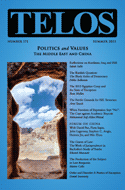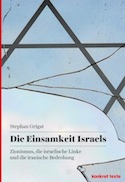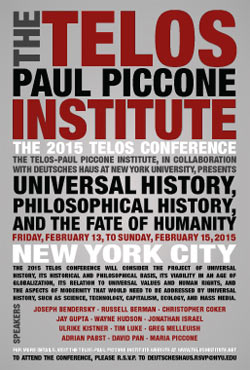By Lukas Szrot · Tuesday, July 7, 2015 The aftermath of the War on Terror rages on despite bipartisan assurances that “major combat operations are over” and that “the war is coming to a close.” This ongoing conflict has produced, and continues to produce, prodigious human casualties and economic hemorrhaging. Tim Luke’s words regarding September 11, 2001, are in many ways as timely today as they were nearly fourteen years ago.
Continue reading →
By Russell A. Berman · Monday, June 15, 2015 Telos 171 (Summer 2015) is now available for purchase in our store.
 Standard accounts of American politics invoke an oscillation between idealist and realist inclinations. The idealists appeal to principles, which they identify as fundamental to the American polity, especially those enshrined in the founding documents: life, liberty, and the pursuit of happiness, transformed into a broad democratization agenda. Of course, revisionist critics have no difficulty in pointing out the failure of that agenda, i.e., the extent to which the empirical history of the country fell far short of realizing its ideals. Yet even that critique, smugly put forward to debunk naïve idealism, in some basic ways is itself indebted to the same idealism, insofar as the complaint of insufficient democratization also implies a call for more democracy, the very core of the idealist program. This is why neo-conservatives and their left-liberal adversaries always had more in common than met the eye (as was abundantly clear to traditional conservatives). Standard accounts of American politics invoke an oscillation between idealist and realist inclinations. The idealists appeal to principles, which they identify as fundamental to the American polity, especially those enshrined in the founding documents: life, liberty, and the pursuit of happiness, transformed into a broad democratization agenda. Of course, revisionist critics have no difficulty in pointing out the failure of that agenda, i.e., the extent to which the empirical history of the country fell far short of realizing its ideals. Yet even that critique, smugly put forward to debunk naïve idealism, in some basic ways is itself indebted to the same idealism, insofar as the complaint of insufficient democratization also implies a call for more democracy, the very core of the idealist program. This is why neo-conservatives and their left-liberal adversaries always had more in common than met the eye (as was abundantly clear to traditional conservatives).
Continue reading →
By Arno Tausch · Tuesday, May 19, 2015  Die Einsamkeit Israels: Zionismus, die israelische Linke und die iranische Bedrohung (Israel’s Solitude: Zionism, the Israeli Left, and the Iranian Threat), by the German political scientist Stephan Grigat, is an important contribution to the overall debate on the Middle East, and it was published just in time, given the background of the Lausanne negotiations with Iran. Grigat dispels the current euphoria about the “breakthrough in Lausanne” and illuminates the many existing darker sides of the Lausanne deal. The present reviewer is of the opinion that, particularly in view of the special historical responsibility of Continental Europe, a careful reconsideration of the realities created in Lausanne and the considerable role played by the EU foreign policy machinery is necessary and that the other side in the conflict—the side of Israel—is also being heard. Die Einsamkeit Israels: Zionismus, die israelische Linke und die iranische Bedrohung (Israel’s Solitude: Zionism, the Israeli Left, and the Iranian Threat), by the German political scientist Stephan Grigat, is an important contribution to the overall debate on the Middle East, and it was published just in time, given the background of the Lausanne negotiations with Iran. Grigat dispels the current euphoria about the “breakthrough in Lausanne” and illuminates the many existing darker sides of the Lausanne deal. The present reviewer is of the opinion that, particularly in view of the special historical responsibility of Continental Europe, a careful reconsideration of the realities created in Lausanne and the considerable role played by the EU foreign policy machinery is necessary and that the other side in the conflict—the side of Israel—is also being heard.
Continue reading →
By Andrew M. Wender · Friday, April 3, 2015  The emerging exhaustion of the Westphalian paradigm of state sovereignty intimates the profoundly contestable and contingent character of modern, Western claims for a universal model of history. Over several centuries, the state has embodied and enforced foundational postulates, such as the pre-eminence of the individual knowing subject, and the imagined divide between religious and secular realms of existence and authority (with the latter sphere effectively internalizing the sacred import of the former). At present, though, the state’s tenuousness, and yet in key instances fierce tenacity, amidst a world of potent transnational forces, portends the urgency for alternative conceptions of the meaning and arrangement of human life. Contemporary Middle Eastern quandaries are especially illustrative of this predicament: for example, the disintegration (as in Iraq, Syria, Libya) or, then again, coercive retrenchment (viz., Egypt) of state formations and nationalist identities; or, to take another sort of instance, the chimerical prospects for coexistence, or even bare existence, among conflicting national communities, as in Israel/Palestine. Are there political paradigms beyond the Westphalian state that could help to integrate plural traditions in pursuit of less exclusionary, and more just, historical possibilities? The emerging exhaustion of the Westphalian paradigm of state sovereignty intimates the profoundly contestable and contingent character of modern, Western claims for a universal model of history. Over several centuries, the state has embodied and enforced foundational postulates, such as the pre-eminence of the individual knowing subject, and the imagined divide between religious and secular realms of existence and authority (with the latter sphere effectively internalizing the sacred import of the former). At present, though, the state’s tenuousness, and yet in key instances fierce tenacity, amidst a world of potent transnational forces, portends the urgency for alternative conceptions of the meaning and arrangement of human life. Contemporary Middle Eastern quandaries are especially illustrative of this predicament: for example, the disintegration (as in Iraq, Syria, Libya) or, then again, coercive retrenchment (viz., Egypt) of state formations and nationalist identities; or, to take another sort of instance, the chimerical prospects for coexistence, or even bare existence, among conflicting national communities, as in Israel/Palestine. Are there political paradigms beyond the Westphalian state that could help to integrate plural traditions in pursuit of less exclusionary, and more just, historical possibilities?
Continue reading →
By Telos Press · Monday, November 4, 2013 We’re pleased to announce that Matthias Küntzel’s Jihad and Jew-Hatred: Islamism, Nazism, and the Roots of 9/11 is now available for purchase as a Kindle eBook. To purchase the eBook, visit the Amazon.com product page or buy it from within your Kindle reader or mobile Kindle app.
Continue reading →
By Richard Herzinger · Friday, August 23, 2013 The Egyptian military has drowned the already weak hope for a transition to democracy in Egypt in blood. That during the storming of the Muslim Brotherhood’s protest camps, 600 people were killed and snipers fired at unarmed demonstrators cannot be justified by any state declared emergency. The military has thus shown that it is willing to unleash ruthless violence in order to sustain its power interests in ways almost reminiscent of the massacres of the Syrian regime.
Continue reading →
|
|
 Standard accounts of American politics invoke an oscillation between idealist and realist inclinations. The idealists appeal to principles, which they identify as fundamental to the American polity, especially those enshrined in the founding documents: life, liberty, and the pursuit of happiness, transformed into a broad democratization agenda. Of course, revisionist critics have no difficulty in pointing out the failure of that agenda, i.e., the extent to which the empirical history of the country fell far short of realizing its ideals. Yet even that critique, smugly put forward to debunk naïve idealism, in some basic ways is itself indebted to the same idealism, insofar as the complaint of insufficient democratization also implies a call for more democracy, the very core of the idealist program. This is why neo-conservatives and their left-liberal adversaries always had more in common than met the eye (as was abundantly clear to traditional conservatives).
Standard accounts of American politics invoke an oscillation between idealist and realist inclinations. The idealists appeal to principles, which they identify as fundamental to the American polity, especially those enshrined in the founding documents: life, liberty, and the pursuit of happiness, transformed into a broad democratization agenda. Of course, revisionist critics have no difficulty in pointing out the failure of that agenda, i.e., the extent to which the empirical history of the country fell far short of realizing its ideals. Yet even that critique, smugly put forward to debunk naïve idealism, in some basic ways is itself indebted to the same idealism, insofar as the complaint of insufficient democratization also implies a call for more democracy, the very core of the idealist program. This is why neo-conservatives and their left-liberal adversaries always had more in common than met the eye (as was abundantly clear to traditional conservatives).  Die Einsamkeit Israels: Zionismus, die israelische Linke und die iranische Bedrohung (Israel’s Solitude: Zionism, the Israeli Left, and the Iranian Threat), by the German political scientist Stephan Grigat, is an important contribution to the overall debate on the Middle East, and it was published just in time, given the background of the Lausanne negotiations with Iran. Grigat dispels the current euphoria about the “breakthrough in Lausanne” and illuminates the many existing darker sides of the Lausanne deal. The present reviewer is of the opinion that, particularly in view of the special historical responsibility of Continental Europe, a careful reconsideration of the realities created in Lausanne and the considerable role played by the EU foreign policy machinery is necessary and that the other side in the conflict—the side of Israel—is also being heard.
Die Einsamkeit Israels: Zionismus, die israelische Linke und die iranische Bedrohung (Israel’s Solitude: Zionism, the Israeli Left, and the Iranian Threat), by the German political scientist Stephan Grigat, is an important contribution to the overall debate on the Middle East, and it was published just in time, given the background of the Lausanne negotiations with Iran. Grigat dispels the current euphoria about the “breakthrough in Lausanne” and illuminates the many existing darker sides of the Lausanne deal. The present reviewer is of the opinion that, particularly in view of the special historical responsibility of Continental Europe, a careful reconsideration of the realities created in Lausanne and the considerable role played by the EU foreign policy machinery is necessary and that the other side in the conflict—the side of Israel—is also being heard.  The emerging exhaustion of the Westphalian paradigm of state sovereignty intimates the profoundly contestable and contingent character of modern, Western claims for a universal model of history. Over several centuries, the state has embodied and enforced foundational postulates, such as the pre-eminence of the individual knowing subject, and the imagined divide between religious and secular realms of existence and authority (with the latter sphere effectively internalizing the sacred import of the former). At present, though, the state’s tenuousness, and yet in key instances fierce tenacity, amidst a world of potent transnational forces, portends the urgency for alternative conceptions of the meaning and arrangement of human life. Contemporary Middle Eastern quandaries are especially illustrative of this predicament: for example, the disintegration (as in Iraq, Syria, Libya) or, then again, coercive retrenchment (viz., Egypt) of state formations and nationalist identities; or, to take another sort of instance, the chimerical prospects for coexistence, or even bare existence, among conflicting national communities, as in Israel/Palestine. Are there political paradigms beyond the Westphalian state that could help to integrate plural traditions in pursuit of less exclusionary, and more just, historical possibilities?
The emerging exhaustion of the Westphalian paradigm of state sovereignty intimates the profoundly contestable and contingent character of modern, Western claims for a universal model of history. Over several centuries, the state has embodied and enforced foundational postulates, such as the pre-eminence of the individual knowing subject, and the imagined divide between religious and secular realms of existence and authority (with the latter sphere effectively internalizing the sacred import of the former). At present, though, the state’s tenuousness, and yet in key instances fierce tenacity, amidst a world of potent transnational forces, portends the urgency for alternative conceptions of the meaning and arrangement of human life. Contemporary Middle Eastern quandaries are especially illustrative of this predicament: for example, the disintegration (as in Iraq, Syria, Libya) or, then again, coercive retrenchment (viz., Egypt) of state formations and nationalist identities; or, to take another sort of instance, the chimerical prospects for coexistence, or even bare existence, among conflicting national communities, as in Israel/Palestine. Are there political paradigms beyond the Westphalian state that could help to integrate plural traditions in pursuit of less exclusionary, and more just, historical possibilities? 

